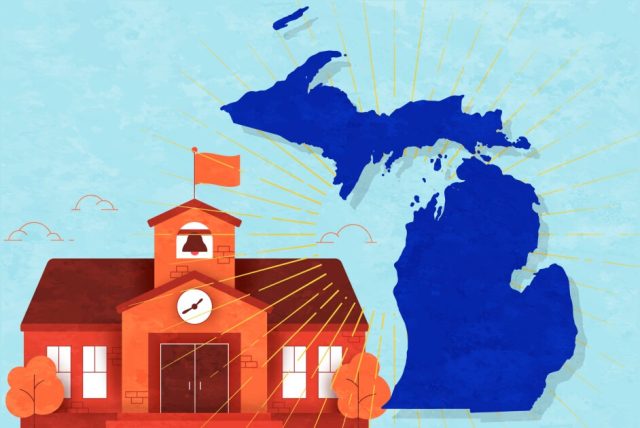[ad_1]
Educators today are fighting battles they never signed up for: lawsuits, book bans, and frivolous investigations. They are also fighting to make ends meet but are often underpaid and carry burdensome college debt. I understand their frustration. Before running for governor, I lectured at the University of Michigan. I taught a course called Running, Serving, and Leading for a few semesters at the Ford School of Public Policy. I took the job to engage with the leaders of tomorrow and return the favor that I got from my public education. That’s why educators do what they do—to help the next generation succeed.
Right now, across the nation, there are two competing visions for public education playing out. In some states, public educators are being undermined, micromanaged, and even criminalized just for doing their jobs.
In Michigan and in other states that fight for public education, we are charting a different path. We are investing in public schools and lowering costs for teachers and families. We want educators to focus on doing what they do best: helping our kids thrive. No educator should have to work a second job just to make ends meet or feel scrutinized on every lesson plan they stay up late writing.
Unfortunately, that is the reality right now for far too many educators. More than 4 in 10 K-12 employees say they “always” or “very often” feel burned out at work, according to a Gallup study released last year. Instead of supporting them, however, some states are passing laws that make their jobs impossible.
Amid its historic teacher shortage, Florida is dictating a myth about the horrors of slavery. Just months before Indiana began the new school year with 1,500 unfilled teaching jobs, the state passed a new law shutting down requirements for dialogue about curriculum, class sizes, and school safety between teachers and administrators. In Texas, where 1 in 3 teachers do not have a teaching certificate, lawmakers are focused on ripping more books off school shelves than any other state in the country—except Florida.
Meanwhile, in Michigan, we are using every tool available to recruit, train, and retain educators. We established a fellowship offering college students scholarships up to $30,000 over three years to become certified teachers. We pay student-teachers $9,600 a semester. We are helping pay back teachers’ student loans—up to $400 a month. We accept out of state teaching certificates, so if you have three years of experience, you can enter the classroom without taking a redundant exam. Some Michigan districts have even offered $10,000 sign-on bonuses or $25,000 down payments on houses.
There are other states following this same blueprint, one that opens doors for future educators, supports current teachers, and shores up the long-term viability of the profession.
The good news is that our efforts are paying off. A recent federal report showed that Michigan’s pipeline for future educators is strong, as enrollment in the state’s educator preparation programs rose by 30 percent between 2018-19 and 2020-21, compared with 7 percent nationally, and enrollment in alternative educator preparation programs not based in higher ed. institutions rose 279 percent, compared with 20 percent nationally. Recent data show we have the third highest average salary for teachers. The other states in the top five—New York, Illinois, Pennsylvania, Wisconsin—all have strong records of supporting public education, too.
My message as governor is simple: If you’re an education professional, come to a state with a positive vision for public education—like Michigan. As a policymaker, I hope that the work we are doing inspires similar action. While everyone talks about our children being our future, not every state is walking the walk. In Michigan and in other states that share our vision for public education, we do.
We know that kids and educators must be nurtured and empowered. We know that our educators teach children to care for people and communities; to be curious, open-minded, and ambitious; to believe in their own ability and better the world around them. We believe that they should be able to enter the classroom without worrying about prosecution, costly loans, or micromanagement.
You want to teach. We need you. Let’s keep fighting for a vision of public education that invests in educators, supports students, and builds a brighter future. And if you can, come to Michigan.
[ad_2]
Source link











